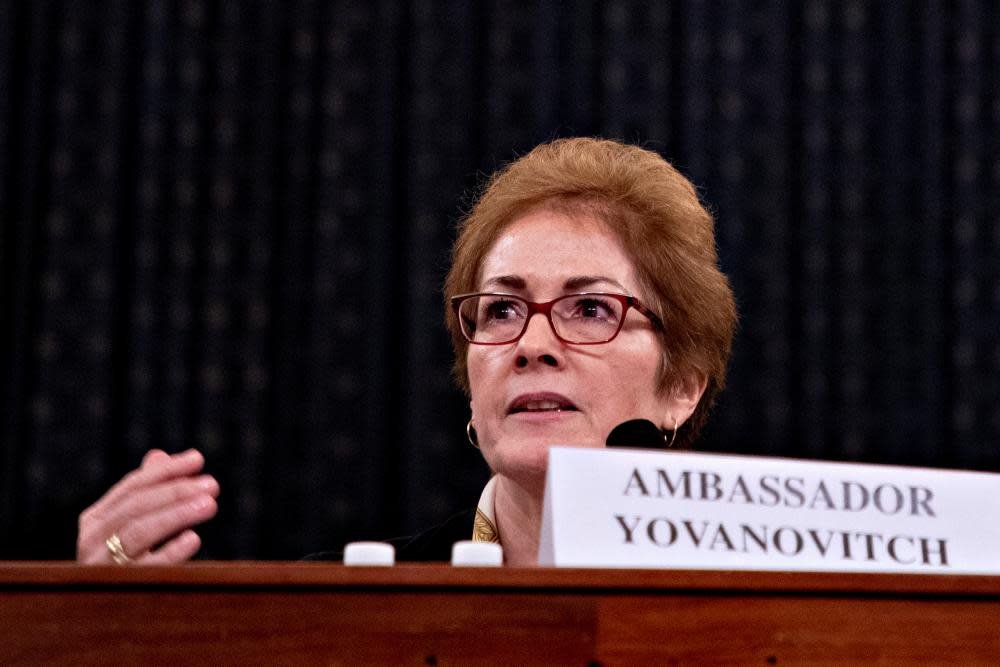Republicans condemned for smearing impeachment witnesses born abroad

Republicans and Donald Trump have sought to smear key witnesses in the impeachment inquiry against the president as having dual or mixed loyalties to the US, due to being born abroad.
The move has sparked condemnation as a bigoted tactic that has maligned career US diplomats and officials as being potentially disloyal to their adopted country due to not being born in America.
The attacks have focused on the Ukraine ambassador Marie Yovanovitch, the National Security Council Ukraine expert Alexander Vindman, and the former White House Russia security expert Fiona Hill.
Trump called the Canadian-born Yovanovitch “bad news”. The British-born Hill told congressional investigators that accusations against Yovanovitch related to a “mishmash of conspiracy theories … an idea of an association between her and George Soros”.
Hill also said far-right conspiracy theories that she herself was a “Soros mole in the White House, of colluding with all kinds of enemies of the President, and, you know, of various improprieties” resurfaced after her deposition before the House intelligence committee was announced.
Having links – real or imagined – to Soros, a Hungary-born billionaire philanthropist who survived the Holocaust, has become a “dog-whistle” for antisemitic abuse.
The attacks against Vindman – who was born to a Jewish family in Ukraine and fled the Soviet Union with his family at age three, subsequently settling in Brooklyn, have been particularly visceral. Vindman is also a decorated US veteran who served in Iraq.
The Fox & Friends television host Brian Kilmeade, for example, said of Vindman: “We also know he was born in the Soviet Union, emigrated with his family young. He tends to feel simpatico with the Ukraine.”
Related: Trump smears and witness drama: key Marie Yovanovitch takeaways
The former Republican congressman Sean Duffy claimed on CNN: “It seems very clear that he is incredibly concerned about Ukrainian defense. I don’t know that he’s concerned about American policy … We all have an affinity to our homeland, where we came from.” On Twitter, Trump’s lawyer Rudy Giuliani said in relation to Vindman: “A US gov employee who has reportedly been advising two gov’s? No wonder he is confused and feels pressure.”
The assaults on the trio’s characters reflect an anti-immigrant – and often, antisemitic – belief that foreign-born US officials maintain a dual loyalty to some outside homeland. While immigrants to the US – including those from the former Soviet Union – might maintain familial or cultural ties, they overwhelmingly embrace being American, experts told the Guardian.
“The theme of dual loyalty runs like a thread throughout American history and the reason for that is immigration has had an important role for the people in North America,” said Alan Kraut, a history professor at American University and member of the school’s Jewish Studies faculty.
In the United States’ early years, people questioned others’ purported allegiance to France or Britain. During the second world war, the internment of Japanese Americans stemmed from the erroneous belief they were “a national security risk because they were accused of having dual loyalty”, Kraut explained. Irish Americans were sometimes seen, because of the strength of their Catholic faith, as having an allegiance to the pope.
Antisemites use the charge of dual loyalty to fuel antisemitism
Since 1948, the “dual loyalty” claim against American Jews has generally been that they “have a dual loyalty to Israel more than the United States”.
“Antisemites use the charge of dual loyalty to fuel antisemitism,” Kraut said . “While it might be sort of déclassé to say, sort of, ‘Jews are an inferior race’, it’s not déclassé to say ‘the problem with Jews in America [is] dual loyalty’.”
Kees Boterbloem, a professor and history graduate director at the University of South Florida, said of Vindman: “I have no doubt that he and his twin brother are absolutely loyal to the United States,” especially since the country they were born in – the Soviet Union – no longer exists.
“How can you be loyal to something that’s no longer there?” he said.
Alina Polyakova, a fellow at the Brookings Institution who is an expert on Ukraine, Russia, and Europe, said there persisted an antisemitic narrative that Jewish immigrants were “never fully” part of their new countries.
“Certainly, [Vindman’s] parents would have experienced that exact same notion because of their Jewish identities. They weren’t ‘actually’ Ukrainian. They weren’t ‘actually’ Russian. They weren’t ‘fully’ citizens of the Soviet Union,” she said.
The attacks were brought up in the hearings last week.
George Kent, the deputy assistant secretary of state who leads Ukraine policy, ended his initial statement with a resounding defense of his colleagues.
“I would like to conclude my opening remarks with an observation about some of my fellow public servants who have come under personal attack,” Kent said to the House intelligence committee, naming Yovanovitch, Vindman, and Hill.
“Masha, Alex, and Fiona were born abroad before their families or they themselves personally chose to immigrate to the United States. They all made the professional choice to serve the United States as public officials, helping shape our national security policy, towards Russia in particular. And we and our national security are the better for it.”

 Yahoo News
Yahoo News 
